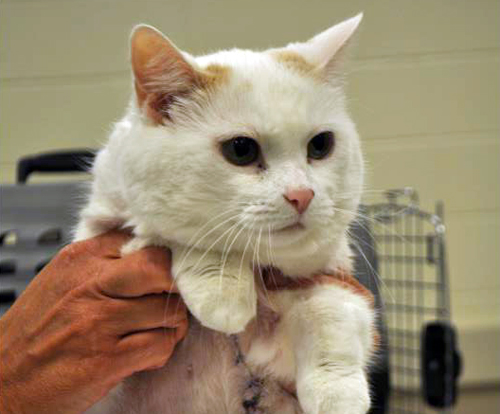
Researchers at the Ontario Veterinary College (OVC) and McMaster University’s Immunology Research Centre have teamed up to treat breast cancer in cats using new vaccines designed to boost the immune system and kill tumour cells without harming healthy tissue. The groundbreaking clinical trial may lead to better treatments for breast cancer in animals and people.
Because breast cancer occurs naturally in cats and is similar in many ways to the disease in humans, feline breast cancer trials may answer important questions about the disease that studies involving artificially induced cancer in laboratory animals cannot, says Prof. Paul Woods, one of the lead investigators.
“Breast cancer in cats tends to be highly aggressive and doesn’t respond well to chemotherapy,” says Woods, a veterinary cancer specialist at OVC and co-director of U of G’s Institute for Comparative Cancer Investigation (ICCI).
“By the time a mammary tumour is detected and diagnosed, the disease has often spread to other parts of the body. So while there’s a lot we can do for cats with standard treatment – which is surgery to remove the tumour – the patient will typically relapse in six to eight months. Our goal with these vaccines is to extend that time as much as possible and to maximize their quality of life.”
The study is the first veterinary trial supported by funding from the Canadian Breast Cancer Foundation, and veterinary clinics across Ontario are taking part by helping to recruit patients.
Maci, a 12-year-old-cat, was the first patient to receive the innovative therapy at OVC’s Mona Campbell Centre for Animal Cancer. Maci responded well to her therapy and is recovering at home with her family in Toronto. The clinical trial is expected to involve up to 30 cats over the next two years.
Collaborating with Woods are Byram Bridle, a viral immunologist in OVC’s Department of Pathobiology, and Brian Lichty of McMaster’s Immunology Research Centre. Bridle and Lichty have developed a strategy for getting oncolytic (cancer-killing) viruses and the cat’s immune system to mount a co-ordinated attack on cancer cells.
“This is a great opportunity to advance this promising area of cancer research in a clinical setting,” says Lichty, whose lab has been working with partners in Ottawa to demonstrate the cancer-killing abilities of viruses on various types of cancer in mice.
“OVC is a unique resource in Canada that not only gives us access to top-notch research infrastructure, but provides a large catchment area of several million people and their pets,” he says. “In order to develop and test new biological therapeutics, we need realistic animal models of human cancer, which is exactly what a large, genetically diverse population of cats with naturally occurring cancer provides. The hope is that, in addition to developing an effective therapy for cats, we’ll be able to apply what we learn here toward strengthening our strategy for treating breast cancer in people.”
Each cat in the study will receive two vaccines, one prior to surgery and one after. Each vaccine contains a virus modified to carry three genes associated with breast cancer.
The first is an injection of a non-replicating adenovirus vaccine intended to trigger an anti-tumour immune response, much like a flu shot stimulates immunity to a particular strain of the flu. This is a routine vaccination that can be performed by the cat’s veterinarian. The family veterinarian may also perform the surgery to remove the tumour, or refer the patient to OVC for the procedure.
The second vaccine is delivered at OVC by an intravenous infusion about four weeks after surgery. It employs a novel oncolytic Maraba virus that can only replicate in tumour cells. In effect, this virus hunts down cancer cells anywhere in the body, infecting and killing them directly. This causes them to express the target protein, generating an even greater immune response.
Woods said the vaccines are proven safe and have been thoroughly tested to meet federal health regulations. However, because this is the first feline clinical trial using the vaccines, precautions are being taken to minimize the risk, including keeping the feline patients in isolation at OVC for a few days after the second vaccination.
“We’re very excited to get this clinical trial underway,” said Woods. “It’s precisely this kind of work that we had in mind when we first launched the ICCI and the animal cancer centre. Pets are part of the family, and many of our clients are keen to try novel therapies – especially when they know that they are contributing to advancing cancer treatment for future human and animal patients.”
[slideshow gallery_id=”17″]